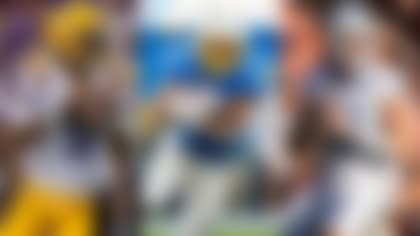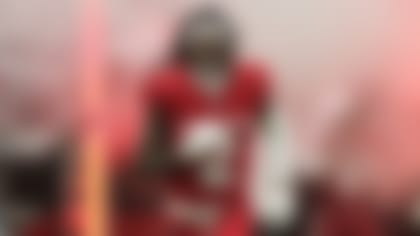MISSION VIEJO, Calif. -- Less than a week away from his April 1 pro day at USC, Mark Sanchez is kicking back in Bob Johnson's low-key, one-room office trailer.
The trailer feels like home to Sanchez, and Johnson -- Sanchez's high school coach -- feels like family. Beyond the mini-blinds, you can see the sunny field where Sanchez once shined, leading the Mission Viejo Diablos to their only state championship in 2004. The quarterback finished with a 27-1 record at Mission Viejo High, which is just one of many reasons why Johnson refers to Sanchez as "The Man."
Go inside USC's pro day
Mike Mayock, Charles Davis and the Path to the Draft crew will be broadcasting live from USC's pro day on Wednesday. Full coverage begins at 6:30 ET.
Johnson, director of Camp Quarterback and father of former USC and NFL quarterback Rob Johnson, clearly prepped Sanchez for the Trojans' complex, pro-style offense. However, no one in this predominately white Orange County community could have prepared Sanchez for the love he now receives from the Latino community in Los Angeles.
"Coming out of high school, people had told me, 'Get ready for the Hispanic community to go wild when you start playing,' " Sanchez said about playing at USC, located in the heart of L.A., a city of 4.6 million Latinos, three-quarters of whom, like Sanchez, are of Mexican descent. "It was a huge surprise. I just didn't know how big it would be."
As a redshirt freshman in 2006, Sanchez stepped onto the field for his first spring scrimmage as a backup, when he realized what it meant to be USC's first pure-blooded Mexican-American quarterback. There, in the Coliseum stands, stood a proud fan, dressed like a Mexican luchador wrestler -- no shirt, satin cape, spandex pants, the words "VIVA SANCHEZ!" emblazoned across the brow of a lucha libre mask.
Sanchez already was a local hero and had yet to even throw his first touchdown pass. But those would come -- 34 in his 16 games as a starter.
In the spotlight
Sanchez grew up in an English-speaking home, spending his early years in Latino neighborhoods of Long Beach, Pico Rivera and Whittier. When he was 6 years old, his family moved south to Orange County, home to the some of the nation's most competitive high school football programs.
Mark's father, Nick, was a fire chief and couldn't afford the high cost of football camps, so the former East L.A. College quarterback opted to coach his son. As a youth, Sanchez was a ball boy for future USC and NFL quarterback Carson Palmer at Santa Margarita High School. Sanchez followed in Palmer's footsteps by enrolling at Santa Margarita, but he transferred to Mission Viejo as a junior to be under the direct guidance of Johnson, who also had tutored Palmer. There, Sanchez played alongside others with Hispanic roots. But being a third-generation Mexican-American never seemed that important -- until he moved to Los Angeles.
At a university where only 14 percent of the student body is Hispanic, Sanchez's high-profile position drew attention.
"As soon as I crossed the Orange County border into L.A., fans would ask me: 'Where are you from? What nationality? You're Mexican? Full?'" Sanchez said. "And then we'd start talking and find out that our families were from the same town in Mexico -- Zacatecas or Jalisco -- and that little connection was a big deal. It was a positive thing."
Los Angeles has always had a warm spot for Latino sports icons, with Mexican-born Fernando Valenzuela spawning Fernando-Mania in the early 1980s and Oscar de la Hoya going from the gyms of East L.A. to becoming a global figure over the past two decades.
For Sanchez, the role in the spotlight seemed simple enough: Just be who you are, celebrate "la raza" (the race) and play your game well.
But it wasn't so simple. Before Sanchez's second USC start in 2007, Dr. Ramon Roges, the team dentist, gave him a "chiste," a joke. Roges, a Cuban, imprinted a tri-colored Mexican flag, complete with an eagle taming a serpent, on a mouthguard, which Sanchez wore during a nationally televised away game against Notre Dame.
"I thought it would be cool for all the fans, a lot of them are Latin-American," Sanchez said. "I thought this would be like a high-five to them in thanks for all the support."
After Sanchez threw four touchdown passes, leading the Trojans to a 38-0 victory, the postgame talk centered on the mouthguard, not the biggest rout in the 79-year history of the Notre Dame-USC rivalry. Some had interpreted the mouthguard to be a radical political statement.
"I got hate mail at school, saying, 'Go back to Mexico. We don't want you here," Sanchez said about having to explain that the mouthguard was worn out of pure respect for his heritage. "Yes, I'm Mexican, but I'm an American -- a place where we can celebrate our culture. Whether we're German or Italians or Chinese -- everybody can celebrate their own culture."
Though his teammates supported him, Sanchez decided to put away the mouthguard.
"It was going to be too big of a controversy," he said, "I didn't want to take away from the team."
But a lesson was learned. And with it came an opportunity.
"It taught me a lot about the position I am in -- how many people you reach," Sanchez said.
That reach will only multiply when Sanchez reaches the NFL. On Wednesday, he has his pro day at USC. In a month, he will be drafted.
Mexican media will cover the draft like never before, and TV Azteca, the largest television network in Mexico, has applied for credentials to the event in New York to bring the moment that Sanchez is selected back home to the community that adores him.
"The media is getting crazy here covering Mark," said Juan Carlos Vazquez Ruiz, an NFL play-by-play commentator for TV Azteca, which is based in Mexico City. "He's even stealing some space from soccer in the newspapers. Mexican fans are paying a lot of attention to him."
And what would Sanchez playing in the league do for NFL game ratings in Mexico, which already are strong but still lag far behind those of soccer, the country's dominant sport?
"I have no doubt that ratings are going to increase at least 50 percent, obviously when he starts a game," Vazquez Ruiz said. "And the merchandising will explode. He alone will create an immediate fan base for the team that selects him in the draft."
Finding his roots
"If you have a lot, give a lot," Sanchez's father had always advised.
Following dad's advice, Sanchez began to give. He reached out to Latino communities, providing Christmas gifts to those in need, bringing school supplies to first-graders, speaking to kids in East Los Angeles high schools. Recently, he joined Los Angeles Mayor Antonio Villaraigosa in a "Day of Service," where he met at-risk teenage boys, referrals of the Department of Probation, living in dormitories at the Optimist Youth Home. Sanchez's main message there, always and everywhere has been direct: To follow your dream, stay in school.
As he spread his message, he also dug deep to understand the Sanchez journey in the Southland. In researching a family history project, he learned why his grandfather always rooted against the Dodgers. Nicholas Sanchez, a former fruit picker, was one of many hundreds of Chicanos who settled in Chavez Ravine, only to be displaced for what eventually became Dodger Stadium. His grandfather always maintained that his home used to be exactly where second base now sits in Dodger Stadium.
"My parents have passed away. They would be so proud of Mark," Nick Sanchez said of the way his son has connected with his culture. "They made sure to establish a strong Hispanic Latino-American foundation in our family. We are all so proud of Mark."
On a recent visit south of the border, Nick Sanchez spotted a glossy framed photo of his son, hung on the wall of a humble taco stand in Baja California. The proprietor explained that he was very proud of this Mark Sanchez -- an important Mexican-American quarterback in America.
By the time he was named the full-time starter at USC in 2008, Sanchez had immersed himself in Spanish classes so he could speak to fans in their native tongue. When TV Azteca came to town, Sanchez chatted without the need of a translator. On game days, fans dressed in serapes and sombreros, and homemade "VIVA SANCHEZ!" T-shirts could be spotted everywhere. The USC band dedicated a song to Sanchez -- "El Matador," by Los Fabulosos Cadillacs -- and played it whenever he took the field.
But what inspired the quarterback most was walking through a postgame swarm of fans and seeing the youngest looking up to him.
"You'd see this little kid, with Boyle Heights Bulldogs on his jersey, and you know he's from East Los Angeles, and he's staring up at me, and he looks at my skin, and sees my last name, and he's just like, 'I can do that, I can be that,' " Sanchez said. "That's awesome. That's the best. That's all you could hope for -- to touch people along the way."
A bright future
Sanchez's chat
USC QB Mark Sanchez was asked about his thoughts on becoming an icon for the Mexican community and the country's NFL fan base during a live chat on NFL.com.
"I'm really excited about that opportunity. The Mexican community has been very supportive, and I'm fine-tuning my Spanish to be able to communicate with them on a regular basis." Chat transcript ...
Johnson, Sanchez's QB mentor, wanders into the trailer and tells his student to "try this," casually handing Sanchez an official NFL football. Sanchez slaps the ball between his hands, tosses it from hand to hand and then spins it on the tip of his finger.
"I love, love sitting here in this trailer. Just hanging out. It's so sweet," Sanchez said. "I mean, I'll be back, but it will never be the same once I go."
The draft is less than a month away, and with it will come a new team likely in a home far from Southern California.
Coming into the league, Sanchez will join a short list of Latino quarterbacks -- most recently Jeff Garcia, Tony Romo and J.P. Losman. But none seem to have been so hugely embraced by their community as this third-generation son. Entering the arena of the NFL will allow him to reach out beyond divisions, conferences and borders. Clearly, there are many people already lifting up Sanchez as a role model for young Latinos everywhere.
"We've had a few Mexicans playing in the past for NFL teams but never a quarterback," Vazquez Ruiz said. "Jeff Garcia's father is from Los Altos Jalisco, and Romo's grandfather is from Chihuahua, but none of them feel Mexican. They don't feel it, even don't know or care about it.
"But Mark is different because he cares about his Mexican heritage. He is even improving his Spanish."
Of the pressures that come with such a responsibility, Sanchez welcomes it all.
"More than anything, it's an honor," he said. "It's always an honor."




